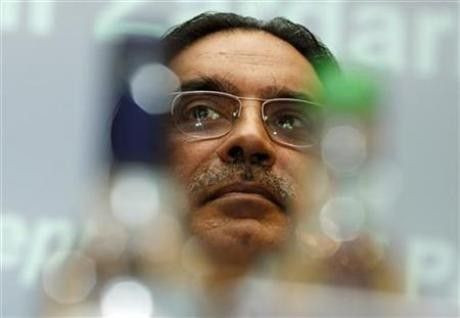Pakistan Envoy to U.S. Quits Over Controversial Anti-Military Memo

Pakistan’s ambassador to the U.S. resigned following suspicions by Islamabad that he sought help from Washington to reduce the power and influence of his country’s military and intelligence apparatuses in the wake of the discovery of bin Laden in Pakistan.
Senior Pakistani officials accused Husain Haqqani of writing, or sending, a mysterious memo allegedly from the president of Pakistan asking for U.S. assistance in diminishing the Pakistani military.
Haqqani denied he was behind the memo and wanted to resign, to end the imbroglio that has only added to the deteriorating relations between Washington and Islamabad.
Haqqani was recently summoned to the Pakistani capital to explain his actions. Reportedly, the office of the Prime Minister formally asked for his resignation. A successor for Haqqani hasn't been named yet.
I have much to contribute to building a new Pakistan free of bigotry and intolerance, Haqqani wrote in a Twitter message. Will focus energies on that.
The controversy erupted in an Oct. 10 column in Britain’s Financial Times newspaper in which Mansoor Ijaz, an American citizen of Pakistani origin and a lobbyist, claimed that an unnamed senior Islamabad diplomat asked him to pass a note from President Asif Ali Zardari to Washington’s top military official at the time, Admiral Mike Mullen, asking for its help to rein in the Pakistani military.
In that memo, Zardari reportedly offered to pressure Pakistan’s notorious intelligence service, ISI, into curbing its support for militants in exchange for Mullen’s help in scaling back the power of the nation’s military complex.
This request allegedly occurred on May 9--just one week after U.S. commandos found and killed bin Laden in a compound near Islamabad.
Ijaz alleged Zardari was fearful the mission to kill bin Laden--which Pakistan’s military supposedly didn't know about--had so enraged and humiliated army brass that they might seek to stage a coup in the country. (Pakistan has witnessed many such coups in its 60-year history).
The embarrassment of bin Laden being found on Pakistani soil had humiliated Mr. Zardari's weak civilian government to such an extent that the president feared a military takeover was imminent, the column said.
He needed an American fist on his army chief's desk to end any misguided notions of a coup -- and fast.”
Now with Haqqani out of the way, more questions have to be raised. One of them is the role of President Zardari,a civilian leader, who was a close ally of Haqqani.
Aleem Maqbool, a BBC correspondent in Islamabad, wrote of the fiasco: “It was difficult to see how Husain Haqqani could survive the huge scandal that's become known here in Pakistan as ‘memogate.’ For many Pakistanis, his alleged actions amounted to nothing less than treason and so there has been a clamor, particularly from opposition groups, for Mr. Haqqani to go, and to be tried for his behavior.”
Maqbool added, “If it is accepted that the memo, which has now been made public, is genuine, the question is did the ambassador act alone, or was it really the Pakistani president asking for help from the U.S.? If that is proved, Asif Ali Zardari's position, too, could be in jeopardy. In any case, already strained relations between the Pakistani government and the army have taken a disastrous turn.”
Interestingly, Ijaz cleared Zardari of having anything to do with the memo and put the blame squarely on Haqqani.
© Copyright IBTimes 2024. All rights reserved.





















